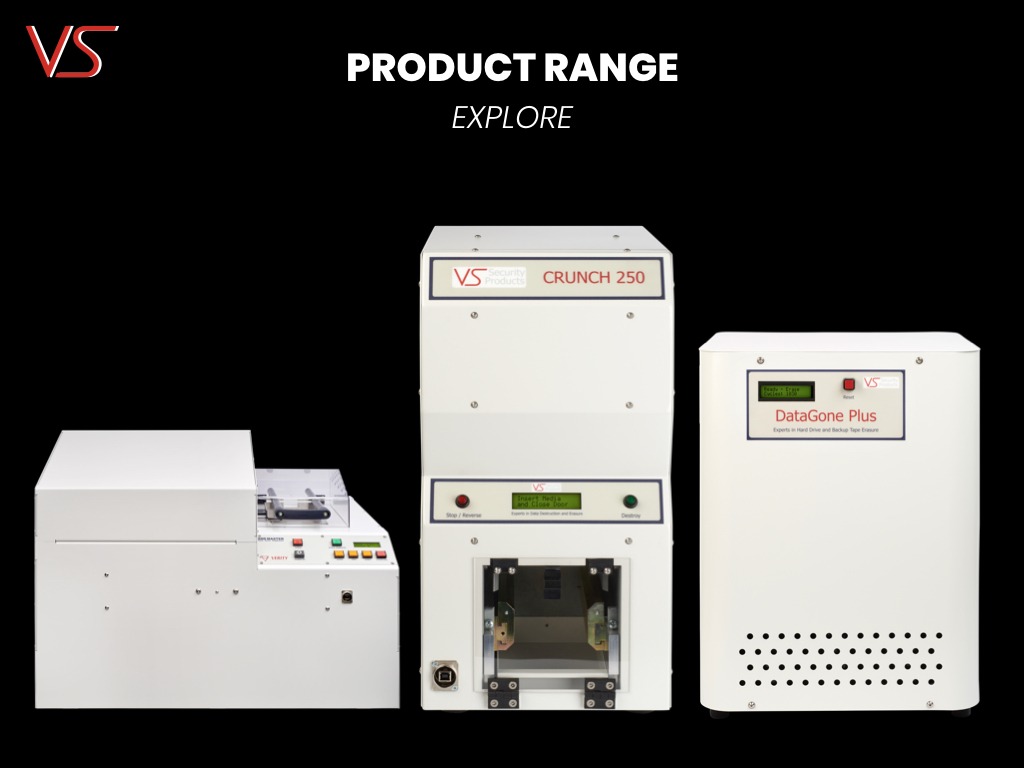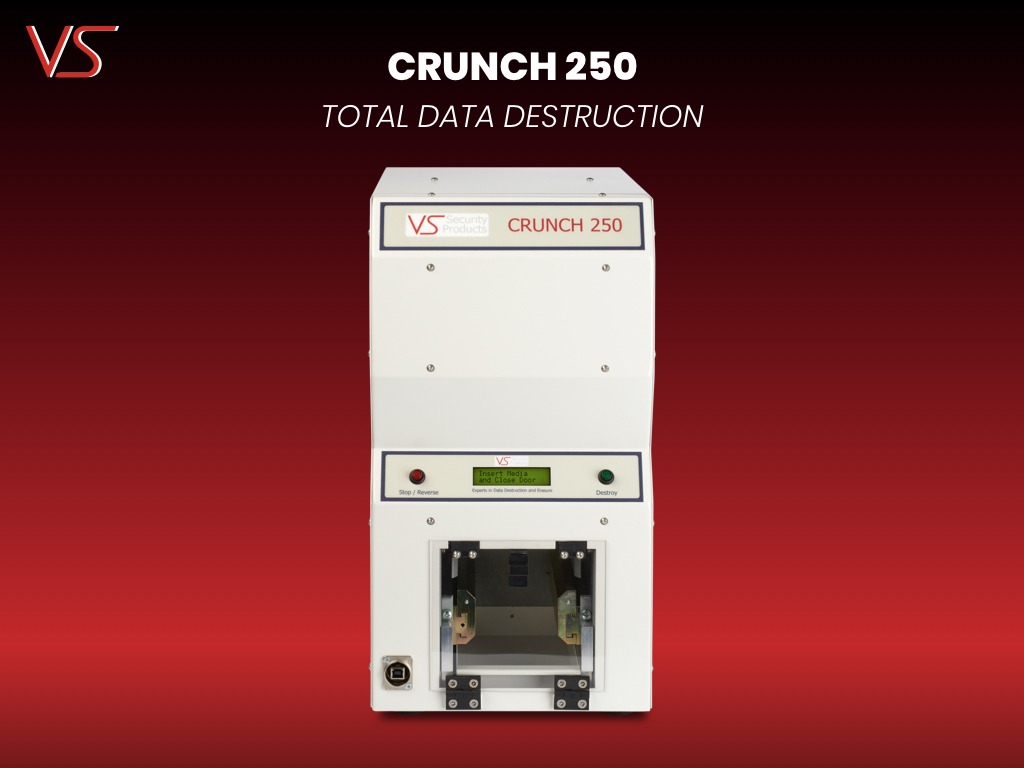Hard Drive Failure: Causes, Risks, and Secure Disposal Solutions for Businesses

Hard drive failure is a pressing concern for businesses that rely on digital storage for operational continuity and data security. When hard drives fail, they not only jeopardize data accessibility but also expose companies to risks of data breaches if they are improperly disposed of. It’s critical for organizations to understand the mechanics of hard drive failure, the security risks posed by residual data, and best practices for data destruction.
This article delves into these aspects and introduces two effective tools for safe data disposal: the DataGauss Max LG degausser for HDDs and the MediaGone 500 shredder for SSDs.
Understanding Hard Drive Failure
1. Mechanical and Electrical Failures in HDDs
Hard Disk Drives (HDDs) are mechanical devices with moving parts. They consist of platters that store data magnetically, an actuator arm to read/write data, and various other components that facilitate data retrieval. Common causes of HDD failure include:
– Wear and Tear: With components that move at high speeds, HDDs are vulnerable to wear and tear over time, which can result in degraded performance and eventual failure.
– Head Crashes: When the read/write head contacts the platter surface, it can lead to physical damage and data loss.
– Motor Issues: The motor that spins the platters can fail, rendering the drive inoperable.
– PCB Failures: The printed circuit board (PCB) in HDDs can also fail due to electrical surges or component degradation, which cuts off communication between the drive and the system.
2. Data Corruption and Logical Failures in SSDs
Solid-State Drives (SSDs), on the other hand, rely on flash memory chips instead of moving parts, making them faster and more reliable in many cases. However, SSDs can still experience:
– Cell Degradation: Flash memory cells have a limited number of write/erase cycles, leading to data degradation and failure over time.
– Firmware Bugs: Errors in firmware can lead to inaccessible data or cause an SSD to fail prematurely.
– Power Loss Issues: Unlike HDDs, which often retain data even during power outages, SSDs can lose data if they suddenly lose power, especially if the write process is not completed.
3. Environmental Factors
Both HDDs and SSDs are sensitive to environmental conditions. High temperatures, humidity, and exposure to dust or contaminants can accelerate drive failure. Physical shocks, such as drops or impacts, are particularly harmful to HDDs because of their moving parts, but even SSDs can suffer from physical damage that renders data inaccessible.
The Risks of Improper Hard Drive Disposal
When a hard drive fails, the data stored on it often remains intact and can still be accessed if the drive is improperly disposed of. For businesses, this poses severe risks:
– Data Breaches: Sensitive data, such as customer information, financial records, and intellectual property, can be extracted from discarded drives, leading to significant financial and reputational damage.
– Regulatory Violations: Improper data disposal can put companies in violation of data protection laws, such as the General Data Protection Regulation (GDPR) or the Health Insurance Portability and Accountability Act (HIPAA), resulting in fines and legal consequences.
– Corporate Espionage: Valuable corporate information, if accessed by competitors or malicious entities, can lead to strategic disadvantages.
Secure Data Destruction: Best Practices for Hard Drives
To prevent unauthorized access, businesses need to ensure complete data destruction. Two industry-recommended methods are degaussing for HDDs and shredding for SSDs.
1. Degaussing for HDDs
Degaussing is the process of exposing magnetic media to a strong magnetic field, effectively erasing the data by scrambling the magnetic domains on the platters. This process renders data unreadable and makes the drive unusable.
Recommended Tool: DataGauss Max LG
The DataGauss Max LG is a leading degausser specifically designed for HDDs. It is equipped with a powerful magnet that guarantees thorough data erasure. Key features include:
– High Magnetic Field Strength: The device generates a magnetic field strong enough to destroy data on high-density HDDs.
– User-Friendly Interface: With a simple control panel, the DataGauss Max LG ensures ease of use while adhering to security standards.
– Compliance with Industry Standards: The degausser is compliant with the latest industry standards and data laws, making it ideal for sensitive data disposal.
Using a reliable degausser like the DataGauss Max LG helps businesses meet compliance requirements and ensures that their data is irretrievable.
2. Shredding for SSDs
For SSDs, degaussing is ineffective since they store data electronically rather than magnetically. Physical destruction through shredding is the most secure method for ensuring data cannot be retrieved. Shredding physically breaks down the memory chips, making it impossible to recover data.
Recommended Tool: MediaGone 500
The MediaGone 500 is an advanced shredder specifically designed for SSDs and other flash storage devices. Its standout features include:
– Precision Shredding: The MediaGone 500 can shred SSDs into pieces small enough to prevent data recovery.
– High Capacity and Durability: Designed for high-volume usage, it is ideal for businesses that need to dispose of multiple SSDs regularly.
– Safety Features: The device has safeguards to protect users during the shredding process, ensuring safe operation.
By using the MediaGone 500, businesses can confidently dispose of SSDs knowing that the data is destroyed beyond recovery.
Disposal of failed HDDs
The disposal of failed hard drives is an essential component of a comprehensive data security strategy for any business. As technology advances and data breaches become increasingly sophisticated, companies must adopt rigorous data destruction practices. By utilizing tools like the DataGauss Max LG degausser for HDDs and the MediaGone 500 shredder for SSDs, organizations can effectively safeguard their data, comply with regulations, and mitigate risks associated with data breaches.
In a data-driven world, secure data disposal is not just a best practice; it’s a critical responsibility that protects a business’s future.
Contact us today to explore suitable hard drive disposal solutions for your business: [email protected]
Photo credit: Samsung


